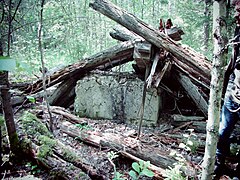Unzhlag
57°43′7″N 44°48′57″E / 57.71861°N 44.81583°E / 57.71861; 44.81583 Unzhlag or Unzhensky ITL (Unzhensky corrective labor camp) (Russian: Унжлаг, Унженский ИТЛ) was a camp of the GULAG system of labor camps in the Soviet Union. Named after the Unzha River, it has headquarters at the railway station Sukhobezvodnoye (Сухобезводное, Сухобезводная), Gorky Oblast. It operated from February 5, 1938 to 1960. The main operation was logging and wood processing industries, but also served a wide variety of other small-scale industries: construction, metalworking, railroad servicing, clothing, footwear, pottery production, etc. The camp had 30 sites (lagpunkts).[1]
There is a small museum of Unzhlag on the private property of a local lore enthusiast Mikhail Shulegin in the village Yurovo, Makaryevsky District [ru].[2]
Notable inmates
- Yusif Vazir Chamanzaminli, Azerbaijani statesman and writer.
- Dalia Grinkevičiūtė, Lithuanian school girl deported in June 1941 who later wrote a memoir about her experiences
- Lev Kopelev describes his experience in Unzhlag in his book, To Be Preserved Forever.[3]
- Yanka Shutovich [be-x-old], Belarusian literary critic, publisher, and cultural activist; served some of his time in Unzhlag, among several other camps.
- Mikhail Yakubovich [ru], Russian revolutionary and Soviet statesman, Menshevik.
Gallery
-
 Barracks leftovers
Barracks leftovers -
 Barbed wire fense leftovers
Barbed wire fense leftovers -
 "Birzha" site leftovers
"Birzha" site leftovers -
 Depot model, Unzhlag museum
Depot model, Unzhlag museum















